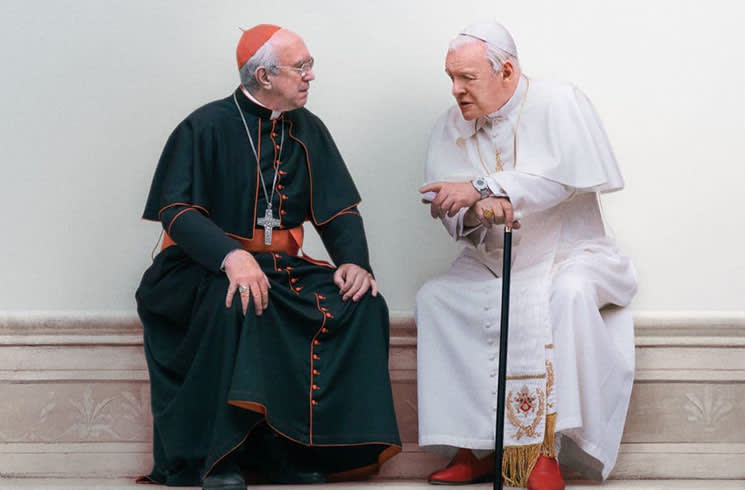It does not take any intuition to realize the main draw for a film like The Two Popes is folded neatly into its premise. The resignation of the overtly conservative, tradition-upholding Pope Benedict XVI, and his unanimous succession by the current Francis, whose reign as been marked by a relative permissibility and progressiveness, was bound to inspire some enthralling dialogues between the two in the lead up to Benedict's surprise resignation.
This is the heart of Fernando Meirelles' (and by extension Anthony McCarten's script and source play) drama, which shines brilliantly when its titular popes come tête-à-tête with adversarial pleasantries, carrying with them their internal conflicts and doubts over the fundamental change of power and structure they are about to enact.
As played out between stars Anthony Hopkins and Jonathan Pryce, their barbed, layered exchanges give life to Meirelles' often distracted and rambling film, which fails to recognize the good thing it has in front of it.
Meirelles is perhaps best known for his co-directing of City of God with Kátia Lund, and if not, The Two Popes frenetic camera and unbridled editing would likely inspire even more pointed confusion. Translating a similar visual language used to represent the chaotic existence living in the impoverished circles of a Rio De Janeiro controlled by organized crime into a dispute over the democratic dimension of the papacy could work, but Meirelles struggles to find how. Scenes never come to a rest or given room to breathe, even when they are structured around the engaging verbal tug of war of its two main characters. In wanting such a dynamically exploratory sense of composition, you are absorbed into the opulence and loneliness of the papacy as we see every conceivable angle of these spaces Benedict and Francis occupy.
Yet when you have two brilliant actors endowing such nuance into these people and their internal conflicts — one wishing to leave the Cardinalship from a lack of institutional reform and a personal sense of failure from his past, and the other wishing to resign from his advanced age and questionable judgements with his authority — one wonders if the approach was necessary. Rolled into their dialogue is such pronounced humanness, their doubts, reservations, and humour all delivered expertly by Hopkins and Pryce, that you sometimes wish The Two Popes more resembled My Dinner with Andre than Meirelles' other filmography. His aggressive style allows him to forcibly argue this story's relevance to our current political climate, but this is a minor grievance.
The lure and hook of The Two Popes are its two main actors and in no way do they disappoint. McCarten's script gives both Pryce and Hopkins hearty material to sink their teeth into and their performances and chemistry give Meirelles' film a strong leg to stand on despite its more questionable directing choices.
(Netflix)This is the heart of Fernando Meirelles' (and by extension Anthony McCarten's script and source play) drama, which shines brilliantly when its titular popes come tête-à-tête with adversarial pleasantries, carrying with them their internal conflicts and doubts over the fundamental change of power and structure they are about to enact.
As played out between stars Anthony Hopkins and Jonathan Pryce, their barbed, layered exchanges give life to Meirelles' often distracted and rambling film, which fails to recognize the good thing it has in front of it.
Meirelles is perhaps best known for his co-directing of City of God with Kátia Lund, and if not, The Two Popes frenetic camera and unbridled editing would likely inspire even more pointed confusion. Translating a similar visual language used to represent the chaotic existence living in the impoverished circles of a Rio De Janeiro controlled by organized crime into a dispute over the democratic dimension of the papacy could work, but Meirelles struggles to find how. Scenes never come to a rest or given room to breathe, even when they are structured around the engaging verbal tug of war of its two main characters. In wanting such a dynamically exploratory sense of composition, you are absorbed into the opulence and loneliness of the papacy as we see every conceivable angle of these spaces Benedict and Francis occupy.
Yet when you have two brilliant actors endowing such nuance into these people and their internal conflicts — one wishing to leave the Cardinalship from a lack of institutional reform and a personal sense of failure from his past, and the other wishing to resign from his advanced age and questionable judgements with his authority — one wonders if the approach was necessary. Rolled into their dialogue is such pronounced humanness, their doubts, reservations, and humour all delivered expertly by Hopkins and Pryce, that you sometimes wish The Two Popes more resembled My Dinner with Andre than Meirelles' other filmography. His aggressive style allows him to forcibly argue this story's relevance to our current political climate, but this is a minor grievance.
The lure and hook of The Two Popes are its two main actors and in no way do they disappoint. McCarten's script gives both Pryce and Hopkins hearty material to sink their teeth into and their performances and chemistry give Meirelles' film a strong leg to stand on despite its more questionable directing choices.




